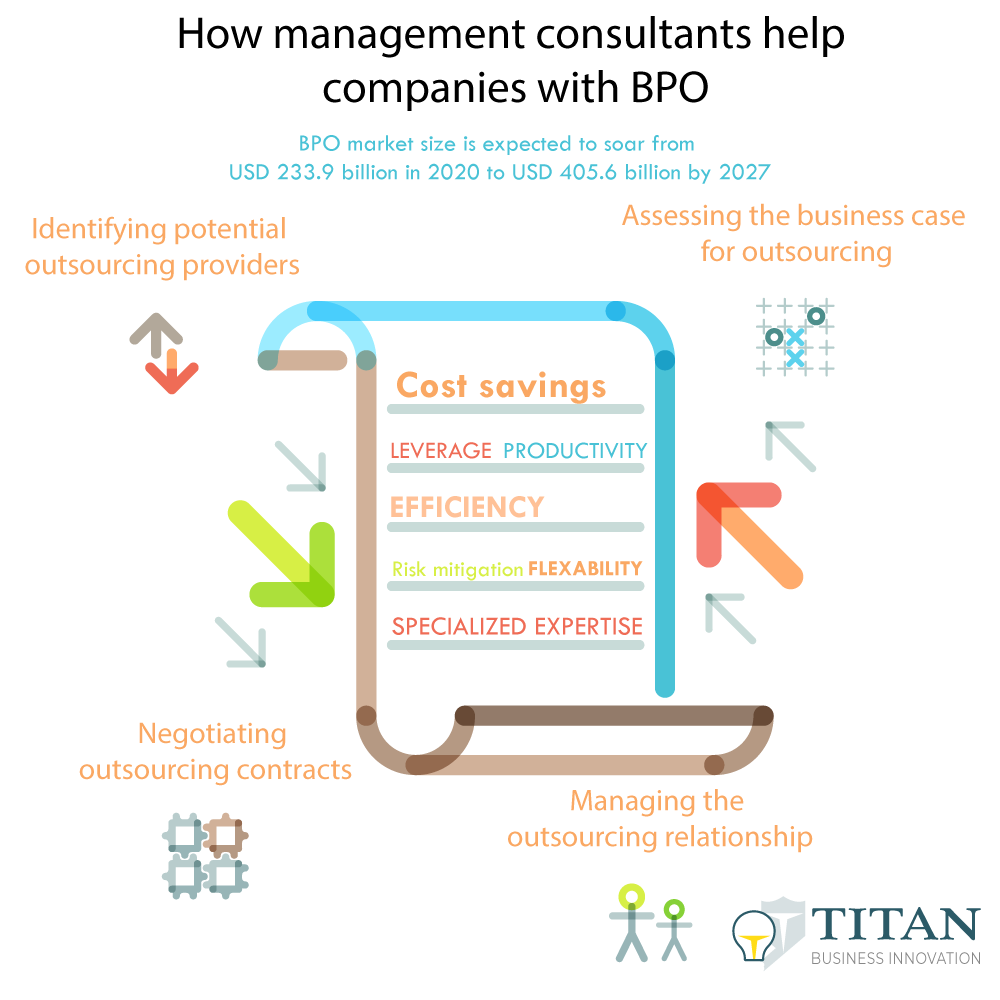The COVID-19 pandemic has caused significant disruption to businesses worldwide, with many companies struggling to adapt to the sudden changes in their operating environment. As a result, the demand for management consultants has surged, as companies seek expert guidance to navigate the new landscape and accelerate their digital transformation efforts. In particular, the Business Process Outsourcing (BPO) sector has seen a sharp rise in demand for consultancy services, driving significant growth in the global BPO market. According to a 2021 report by global market research firm MarketsandMarkets, the BPO market size is expected to soar from USD 233.9 billion in 2020 to USD 405.6 billion by 2027, at an impressive compound annual growth rate (CAGR) of 8.4% during the forecast period. As companies strive to stay competitive in the post-pandemic world, the role of management consultants in driving business success has never been more critical.

What is Business Process Outsourcing (BPO)?
BPO is the practice of getting third parties to look after non-core business functions. BPO can include a range of back-office, middle-office, and front-office functions, such as data entry, payroll processing, customer service, and human resources.
Outsourcing is taking off in Japan, especially in the back and middle office areas. New software solutions streamline tasks and reduce the need for manual processes. Rather than retrain workforces, Japanese companies are improving efficiencies by outsourcing human resources, information technology, finance, and accounting to third parties.
However, BPO also has its challenges, including language and cultural barriers, data security risks, and potential issues with quality control. In addition, there highly risky to embark on this process without a clear plan and an experienced team to successfully transition to a new business structure.
Advantages of BPO
- Cost savings: Outsourcing middle and back-office functions can result in cost savings for the company. Outsourcing providers can leverage economies of scale to offer services at a lower cost than the company could achieve in-house. Additionally, outsourcing eliminates the need for the company to invest in infrastructure and technology to support these functions.
- Access to specialized expertise: Outsourcing providers often have expertise in specific areas, such as data processing, transaction processing, and document management. By outsourcing these functions, companies can access this specialized expertise without hiring and training staff internally.
- Improved efficiency: Outsourcing providers can use their expertise and technology to streamline middle and back-office functions, improving efficiency and productivity. Internal staff is now freer to focus on core business functions.
- Increased flexibility: Outsourcing providers can offer flexible solutions to meet the company’s needs. Flexibility includes scaling services up or down as needed and adjusting services to accommodate changing business requirements.
- Risk mitigation: Outsourcing providers can help mitigate risks associated with middle and back-office functions, such as data security and compliance. Outsourcing providers typically have robust security measures and compliance procedures, which can help protect the company from legal and financial liabilities.
How management consultants help companies manage BPO
Management consultants can help companies outsource by identifying opportunities, assessing potential outsourcing providers, negotiating outsourcing contracts, and managing the outsourcing relationship.
Here are a few examples of how management consultants can help companies outsource:
- Assessing the business case for outsourcing: Management consultants can analyze a company’s business processes and identify which could be outsourced to improve efficiency and reduce costs. They can also conduct a cost-benefit analysis to determine if outsourcing is viable.
- Identifying potential outsourcing providers: Management consultants can research and identify potential outsourcing providers that meet the company’s needs. They can evaluate the providers based on their capabilities, experience, pricing, and other factors to determine which provider would best fit the company.
- Negotiating outsourcing contracts: Management consultants can help companies negotiate outsourcing contracts with the chosen provider. They can ensure that the contract includes the necessary provisions to protect the company’s interests, such as service-level agreements, security measures, and dispute-resolution mechanisms.
- Managing the outsourcing relationship: Management consultants can help companies manage the outsourcing relationship with the provider to ensure that the provider meets the agreed-upon service levels and delivers the expected results. They can also help resolve any issues arising during the outsourcing relationship.
Examples of companies using management consultants
Management consultants have helped numerous companies with BPO over the years. Here are some real examples of companies that have benefited from the expertise of management consulting firms in outsourcing their business processes:
- Procter & Gamble: Procter & Gamble is a consumer goods company that has worked with several management consulting firms to outsource various business processes, including finance and accounting, human resources, and IT. One example is their partnership with Accenture to outsource HR functions in North America, resulting in significant cost savings and improved efficiency.
- IBM: IBM is a technology company that has used BPO to improve efficiency and reduce costs in various areas of its operations. For example, IBM worked with Deloitte to outsource its finance and accounting functions in Europe, resulting in cost savings of over $1 billion over five years.
- Nissan: Nissan is an automotive company that has used BPO to streamline its supply chain operations. The company worked with Accenture to outsource logistics and supply chain management functions, improving efficiency and cost savings.
- Deutsche Bank: Deutsche Bank is a financial services company that has used BPO to improve its back-office operations. The bank worked with several management consulting firms, including Deloitte and Accenture, to outsource various functions, such as IT support, document processing, and transaction processing, resulting in significant cost savings and improved efficiency.
- Eli Lilly: Eli Lilly is a pharmaceutical company that has used BPO to improve its clinical trial operations. The company worked with several management consulting firms to outsource various functions, such as data management and statistical analysis, resulting in improved efficiency and faster time to market for new drugs.
Overall, management consultants can provide valuable expertise and guidance to companies looking to outsource. By leveraging their knowledge and experience, companies can streamline their outsourcing process and achieve their outsourcing goals more effectively. Therefore, the demand for management consultants is growing rapidly in Japan as companies search for competitive advantages.


